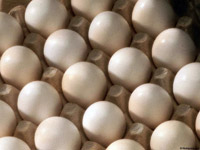During the yearend, the Committee for the Protection of Economic Competition (CPEC) conducted studies on large consumer products-butter, eggs, beer, cement, petroleum and other items in the market-and found out that producers will gain profit based on the prices.
The commission also discussed the applied pricing policies of the companies in the market. These are the markets where there are companies holding high positions and where there is “a possibility of anti-competition agreements and application of unconfirmed prices”. Basically, as a result of the studies, the commission has noticed “a line of conduct for having a unified pricing policy.” The CPEC also found out that the price for eggs in Armenia ranges from 30-35 drams per egg; however during the end of 2006, the price for one egg had gone up to 65-71 drams and remains at that price despite the fact that Armenia is an egg-exporting country.
“Finally, why do Armenian citizens have to pay 70 drams for eggs?” announced head of the CPEC Ashot Shahnazaryan during a yearend press conference.
At the time, the head of the commission gave egg-producing companies and the rest of the companies in the market 5 days to review their pricing policies. He offered the producers to take measures “to prevent the application of similar prices as a result of anti-competition agreements and raising the level of skyrocket prices”. Afterwards, the commission began an even deeper study in that market-it started monitoring and the last day is January 20. During that time slot, the companies holding high positions must present the corresponding documents and prove to the commission that they are not that guilty for the high prices for eggs and other products and that they sell their products to the stores at prices lower than the original sale price. Besides that, the companies must also give information regarding the review of pricing policies for products.
“I was out of the country during that session,” said president of the “Max Group” company Khachik Manukyan. “When I returned, I presented the documents of the “Lusakert” factory to the commission. I think that the commission was convinced that there is no such price as 30-35 drams for one egg.”
“We sell the eggs to the stores for 54 drams per egg. True, there are also eggs sold at 60-65 drams because they are a super kind with two yolks. But only 1.2% of our sold eggs were of a super kind in 2006,” said director of the “Lusakert” factory Arsen Bagratyan.
During late 2006, the price for one egg ranged from 65-70 drams. But the stores assure that the factories sell the eggs to them for 60-65 drams per egg. Store owners only add 6-7 drams when selling. In regard to prices, the commission was more inclined to believe the store owners. Producers, on the other hand, suggest the commission to check their documents and the information given by the stores. As a result, what we get is a contradiction and as you get mixed up in the producer-seller relations, you don’t know where the 10-15 drams went and who lost that money.
“Lusakert” is the leading egg-producing company in Armenia and holds 33% of the egg market. Ninety-percent of the eggs of Armenia are produced by the three large egg-producing companies of Armenia , including “Lusakert”, “Arzni” and “The Yerevan Poultry Factory”. The eggs produced by these three companies are sold at practically the same price in stores. At first sight, you can assume that the three companies come to an agreement when it comes time to determine the price. According to Bagratyan, the average price for eggs produced by “Lusakert” in 2006 was 54 drams per egg.
“I don’t know why eggs are that expensive in stores. The commission should study and find out. We have provided the documents of our production and prices to the commission. I think that after the monitoring, it will be clear for them and everyone that we haven’t just fixed the prices and don’t receive any major profits. Mr. Bagratyan didn’t say how much “Lusakert” sells its eggs, but he neither denied nor affirmed that the 30-35 drams that Ashot Shahnazaryan claimed was false.
“I don’t want to say anything. After all, that’s the secret of our company’s business,” said the company director. He also didn’t say for how much the company exports its eggs to Georgia . He only said that they are “cheaper than our eggs sold in Armenia .”
Mr. Bagratyan also recalled that during the first trimester of 2006, poultry companies weren’t able to sell eggs and bird meat products due to the bird flu. Then the demand went up so much that they weren’t able to supply enough. Perhaps this is the reason why eggs were imported from Iran in order to get rid of the deficit. That was unprecedented for the last 5-6 years. The ECPC told “168 Hours” that not only eggs, but also beer, petroleum, butter and cement producing companies holding high positions in the market had provided the commission with information during the monitoring period. However, the commission can’t give an evaluation yet because it hasn’t summarized the results. It’s hard to say whether the commission is still of the same opinion, according to which the producers of the abovementioned products get major profits and must lower their prices, or perhaps that opinion has changed based on the “information” provided by the companies during this past year. In any case, until the end of 2006, the commission was certain that the companies holding high positions in the market were getting huge profits. We’ll find out what their current opinion is by the end of January .

